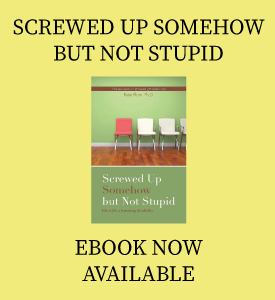There are different ways to divide up the idea of memory. One method is to divide it into implicit and explicit memory, and to further divide explicit memory into episodic and semantic memory. My memory varies a lot, over these three types. I think this is probably a part of NLD.Implicit memory is stuff that we acquire without conscious thought. How to tie our shoes or drive a car, for instance.
Explicit memory is, as I noted, divided into episodic memory and semantic memory. Episodic memory is autobiographical – memories of what things we did, who we did them with, how old we were when we did them and so on.
Semantic memory is memory for facts, words and so on.
My implicit memory is well below average, my episodic memory is very very low but my semantic memory is very good.
I wonder if this is similar for others with NLD; let me know in the comments.



Hey, I messaged you on LinkedIn. As for me, I find the same as you but my episodic memory randomly encodes and is particularly sensitive as most people’s apparently are to associative stimulus and emotions that make a moment stand out.
I am nearly a savant with memory regarding certain long term semantic memory in certain domains, but it has to be part of a semantic web, as it were — if I can’t connect it to information I already know, I may not retain it. But if it is part of a topic I care about and know a good deal about, anything I learn that I can connect by association to prior knowledge is retained forever.
But there are parts of my memory that are terrible. I have never been any good at remembering peoples’ names, although I will remember who they are, where I met them, stories they told me, what they do, and so on. But their names will escape me. I have tried various mnemonic training methods to increase this capacity but they often don’t really help. Oddly, I am more likely to remember a person’s name (or username) from print, than from hearing it, so if I can get their business card or write it down that can help most.
My episodic memory is pretty good, but spotty. I can remember things going back to my toddler years. I started trying to remember events of my life when I was about eight years old when I realized that most adults didn’t remember what it was like to be a child anymore, and had the foresight as a gifted kid to try to “record” my memories for my future self so this wouldn’t be my fate (it worked!). My idea of my unfathomably ancient future self, in my mind at the time, was me-at-forty, lol, and here I am at nearly 60, still quite easily remembering my internal states as a kid.
But there are semantic memory issues I’ve never been good at. I was always good at geometric related mathematical disciplines, but for some reason mathematical formulae were always hard to memorize for me. So algebra related things killed me.
So I was slow at higher math, often having to work out problems from axioms, logic, or remembered proofs, rather than the shortcuts. When I took AP/Trig, I only got through 35 of 50 problems (I think it was), and thought I’d get a terrible score, but I got every one of them right because I’d worked them out from principles.
Computers saved me on this, by the 80s — I knew what to tell the calculator/computer to do, heh.
On the other hand, I might not be able to remember to come up for air from what I’m doing to eat, or that I’m late for something, or what’s on my to-do list — all these things need external tools and I have to remember to check the external tools by some kind of discipline, which can break down, lol. I have been at my best in my life when working with a non-learning-disabled assistant (like an administrative assistant or secretary) who can help keep me on task with the NT world.
My long term memory (and ability to synthesize/analyze/predict from that information) is often off the charts compared to NT folks — it’s how I’ve often made my living, one way or another. But it’s executive function and short term memory where I fall short. The classic leather patch on the elbow absent minded on-the-spectrum type.
Do you believe your memory deficits and assets are related to NVLD. I, too, am an almost 60 yr old Woman whose memory profile seems to be pretty exactly that of yours. I think my impulses to think intensely about and connect events, emotions, etc have led to my kind of extraordinary ability to “predict”, too. I’m 2E and proud of it and just starting to be loud about it!
You should add onto how with traumas and somatic therapies for instance, it’s implicit procedural memories related to the pain hurt etc that our body adopts across time that can cause armoring, certain postures and movement sequences. This isn’t verbal so people don’t typically think to heal it, but the body stuff and somatic stuff is def neccesary, I heard some lady cured her cptsd by doing 9 months of somatic classes with a group, which if you understand polyvagal theory, that would def help heal the nervous system.